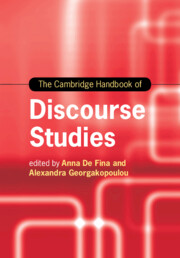Book contents
- The Cambridge Handbook of Discourse Studies
- Cambridge Handbooks in Language and Linguistics
- The Cambridge Handbook of Discourse Studies
- Copyright page
- Contents
- Figures
- Tables
- Contributors
- Preface
- Part I (Con)Textualizing Discourses
- 1 Registers, Styles, Indexicality
- 2 Situating Discourse Analysis in Ethnographic and Sociopolitical Context
- 3 Context and Its Complications
- 4 Historicity, Interdiscursivity and Intertextuality in Discourse Studies
- 5 Rethinking Narrative: Tellers, Tales and Identities in Contemporary Worlds
- Part II Perspectives and Modes of Analysis
- Part III Discourse Materialities and Embodiment
- Part IV (Trans)Locations and Intersections
- Part V Ethics, Inequality and Inclusion
- Part VI Discourses, Publics and Mediatization
- Index
- References
5 - Rethinking Narrative: Tellers, Tales and Identities in Contemporary Worlds
from Part I - (Con)Textualizing Discourses
Published online by Cambridge University Press: 28 September 2020
- The Cambridge Handbook of Discourse Studies
- Cambridge Handbooks in Language and Linguistics
- The Cambridge Handbook of Discourse Studies
- Copyright page
- Contents
- Figures
- Tables
- Contributors
- Preface
- Part I (Con)Textualizing Discourses
- 1 Registers, Styles, Indexicality
- 2 Situating Discourse Analysis in Ethnographic and Sociopolitical Context
- 3 Context and Its Complications
- 4 Historicity, Interdiscursivity and Intertextuality in Discourse Studies
- 5 Rethinking Narrative: Tellers, Tales and Identities in Contemporary Worlds
- Part II Perspectives and Modes of Analysis
- Part III Discourse Materialities and Embodiment
- Part IV (Trans)Locations and Intersections
- Part V Ethics, Inequality and Inclusion
- Part VI Discourses, Publics and Mediatization
- Index
- References
Summary
This chapter teases out key developments in discourse studies that have involved a radical rethinking of how stories and identities are being conceptualized and studied. First, we focus on how the role of the teller has been rethought by discussing the shift to interactional approaches to identities (cf. identities-in-interaction), including positioning analysis and small stories research. We then discuss how the personal story and story ownership have been reconceptualized with a focus on the uses and mobilization of stories in public arenas, especially politics. Third, we move to the reexamining of the role of space in the constitution of identities in stories, by focusing on work on mobile and migrant populations and on chronotopes as a concept increasingly employed for exploring the contextualization of stories. Finally, we discuss the implications of digital environments and media affordances, including the actual design and “curation” of stories, for how we tell stories and present ourselves online.
Keywords
- Type
- Chapter
- Information
- The Cambridge Handbook of Discourse Studies , pp. 91 - 114Publisher: Cambridge University PressPrint publication year: 2020
References
Further Reading
This special issue brings together work on narrative and identities by scholars from a variety of areas, including social psychology, anthropology, sociolinguistics and narratology.
This is a comprehensive volume on main issues and trends in narrative studies, with several chapters following a discourse analytical approach.
This volume brings together sociolinguistic and discourse analytic work on stories and identities in digital environments.
This volume presents a flexible, context-sensitive definition of storytelling premised on a dimensional approach to it, which is widely applied in research on narratives and identities.
References
- 5
- Cited by

